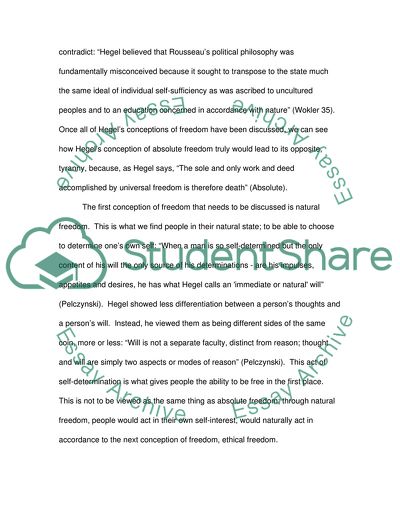Cite this document
(Hegels Conception of Freedom Essay Example | Topics and Well Written Essays - 2250 words, n.d.)
Hegels Conception of Freedom Essay Example | Topics and Well Written Essays - 2250 words. Retrieved from https://studentshare.org/philosophy/1547143-why-according-to-hagel-does-the-attempt-to-realise-absolute-freedom-bring-about-its-oppositeabsolute-tyranny-to-what-extent-do-you-agree-with-hagel
Hegels Conception of Freedom Essay Example | Topics and Well Written Essays - 2250 words. Retrieved from https://studentshare.org/philosophy/1547143-why-according-to-hagel-does-the-attempt-to-realise-absolute-freedom-bring-about-its-oppositeabsolute-tyranny-to-what-extent-do-you-agree-with-hagel
(Hegels Conception of Freedom Essay Example | Topics and Well Written Essays - 2250 Words)
Hegels Conception of Freedom Essay Example | Topics and Well Written Essays - 2250 Words. https://studentshare.org/philosophy/1547143-why-according-to-hagel-does-the-attempt-to-realise-absolute-freedom-bring-about-its-oppositeabsolute-tyranny-to-what-extent-do-you-agree-with-hagel.
Hegels Conception of Freedom Essay Example | Topics and Well Written Essays - 2250 Words. https://studentshare.org/philosophy/1547143-why-according-to-hagel-does-the-attempt-to-realise-absolute-freedom-bring-about-its-oppositeabsolute-tyranny-to-what-extent-do-you-agree-with-hagel.
“Hegels Conception of Freedom Essay Example | Topics and Well Written Essays - 2250 Words”. https://studentshare.org/philosophy/1547143-why-according-to-hagel-does-the-attempt-to-realise-absolute-freedom-bring-about-its-oppositeabsolute-tyranny-to-what-extent-do-you-agree-with-hagel.


